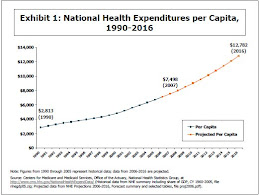I think it would be difficult to identify a single defining factor which could account for the increase in spending on healthcare, but some possible/obvious candidates could be the increased cost of healthcare (technology etc), increased burden of disease (i.e. higher rates of "expensive" diseases), highly inefficient care, lack of prevention, and the extremely complex system through which medical care is paid for.
As is the case with the problem, the solution would be multifactorial, however a start could be the reduction in bureacracy by simplifying the healthcare system and implementing a single-payer system (or a national health service?) to make everything run a bit more smoothly while at the same time providing coverage to as many people as possible. Other steps could be to reduce hospital spending by increasing outpatient care and reducing the number of inpatients admitted. Of course, increasing health-awareness and prevention measures could potentially be the biggest factor in reducing money spent on healthcare, as a vast portion of today's major health conditions are "preventable."
Monday, January 26, 2009
Subscribe to:
Post Comments (Atom)

I whole-heartedly agree with everything that Andrew said in this post. It is virtually impossible to pinpoint a single factor for the increase in national healthcare spending. There are just simply too many reasons including the ones asked about in the question itself (technologies, inefficiency, and prices). But moreover, we have to be aware that there has been a drastic increase in prevalence rates of both preventable diseases as well as those that are untreatable. Additionally, increased life expectancies tend to go hand-in-hand with the fact that individuals with chronic diseases end up spending either more time in hospitals or more money on medications and treatments.
ReplyDeleteI think that the impacts this will have on businesses and families are obvious. Families will feel a financial burden that families of the past never felt when it came to healthcare and the routine visit to a physician. Meanwhile, businesses will have to cut back on the benefits that they are able to provide for their employees.
Again, as Andrew mentioned in this post, the solution would have to be carried out in a multi-faceted manner and there is no single cure-all answer that would solve the problems America faces when it comes to healthcare. The most drastic way to handle the problem is to universalize healthcare. However, it may not be the most reasonable and most compatable within the United States. On a more local scale, there are also areas where improvements can be made and where dollars can be saved. None of this, however, will be possible without first informing and educating health professionals and the general public as to the inherent situation and what looms ahead beyond the current economic crisis in which many Americans are struggling.